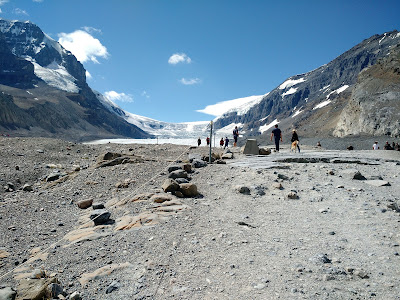That came home to me this summer as Glen and I visited with family out west at the end of August. After a visit with Glen's sister and family in Waskada, Manitoba, and with my sister and husband in Warner, Alberta, we took the long way around to Edmonton through Banff and Jasper National Parks. Guilty of taking Banff for granted all the years I'd lived in Alberta, I had never been to Lake Louise, I suggested we do so on our way through. A laughable idea. We weren't naive enough to think we were the only ones to get a free park pass in honour of Canada's 150th but were naive enough to think that passing through on a weekday would help. As we drove toward the village site traffic volunteers directed us along. With each turn we thought we were being helped toward a parking lot. That is until we were directed in a big circle right back to the highway. Good times. Fortunately Lake Louise wasn't our only hoped for stop. Along the way we paid a visit to Bow Lake beneath the Bow Glacier.
It was stunning, no where near as busy, and brought a smile to my face when our dog Finley took a few steps in to the headwaters of the Bow River, source of Calgary's drinking water. Apparently the Edmonton-Calgary rivalry was not erased by several months living in Ontario.
The main purpose of our long-way-round was to visit the Colombia Icefield. Again, I took getting to see it for granted when I lived in Edmonton.
I was awestruck. But not just because it was staggering in size, and clearly powerful, having at one time carved out a large valley. I was awestruck at how far it had receded. When first discovered it filled the valley up to the present highway. Glen and I parked where it had been in 1942, a half hour walk away. We met people who remembered how much further down the valley it had been in the 1980's. And with each decade the speed of its recession is accelerating. Some studies suggest the world's alpine glaciers may be gone in 30 years. We clearly need experiences in national parks, the prodding of the Season of Creation, and any other opportunities to grow in appreciation for our world.
We also need to find ways to protect it, which leads me to another awe-inspiring experience we had - we toured the Edmonton Waste Management Centre. Clearly I need to get a life. And yet it was like Christmas and Easter rolled into one. Edmonton's facility is world class. In fact, representatives from around the world have come to see Edmonton's one-stop-shop waste management.
How does it process plastic bags and cling wrap turned away by most other municipalities? Chopped up into "plastic fluff", all of this waste is converted into methanol and ethanol in a gassification plant. Plastic bags, made from oil, turned into fuel to be added to gasoline. That's pretty cool.
As I said, it was like Christmas and Easter rolled into one for me, so much so that I'm not sure if I was more awe-struck by the Colombia Icefield or by the EWMC? In the end I am awestruck by both. The glacier reminds me of the majesty of the earth, just as it rapid retreat reminds me of our human impact on it. And the amazing work being done to turn garbage into gold reminds me that there are solutions to our crisis if we put our minds to it.
Each year we have the Season of Creation to remind us of the wonder of our world. But more importantly we have a 365 days of the year responsibility to take care of it.






































